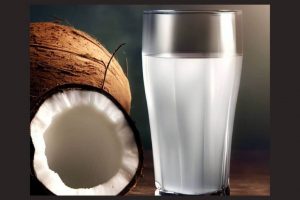What is the best substitute for Coconut Water?
If you’re looking for substitutes for coconut water, there are several options to consider, especially if you want a similar level of hydration and a touch of tropical flavor. Try using: Coconut Milk, Pineapple Juice, Lemon Water, Cucumber Water, Watermelon Water, Aloe Vera Juice, Cashew Juice, Oat Milk, Plain Water, or Rice Milk.
What is Coconut Water?
Coconut water is the clear, slightly sweet liquid found inside young, green coconuts. It’s a natural and refreshing beverage that has gained popularity for its hydrating properties and health benefits. Here’s a bit more about coconut water:
Source: Coconut water is obtained from the center of young, green coconuts. It’s distinct from coconut milk, which is made by grating the flesh of mature coconuts.
Hydration: Coconut water is often called “nature’s sports drink” because it contains electrolytes like potassium, sodium, and magnesium, which help with hydration. It is recognised as a great choice for rehydrating after exercise.
Nutrient-Rich: In addition to electrolytes, coconut water is also a great source of vitamins and minerals, including vitamin C, calcium, and antioxidants. Did you know it is also low in calories and fat?
Taste: Coconut water has a mildly sweet and nutty flavor. The taste can vary slightly depending on the coconut’s maturity, with younger coconuts generally having a sweeter taste.
Versatility: Commonly consumed as a refreshing beverage on its own, it can also be used in smoothies, cocktails, and even as a base for various tropical-inspired dishes.
Health Benefits: Some people like drinking coconut water for its potential health benefits, which may include aiding in digestion, promoting kidney function, and supporting overall well-being.
Okay, before we look at your coconut water substitute options, let’s deal with that empty cupboard situation!
Where can I buy Coconut Water?
If you want to be more prepared and ensure you don’t run out of coconut water, then you should stock up now.
Nowadays, most delicatessens and general supermarkets stock a wide variety of coconut water. Or if you prefer you can also purchase coconut water on-line.
So why not jump on and place your order today.
STOCK UP NOW!
Pure organic Coconut Water, packaged at source. Fresh, pure taste, and packed full of electrolytes to support fast hydration.
Non-GMO, gluten-free and suitable for vegan diets.
What can I substitute for Coconut Water?
Here are some of the best ingredients to substitute the flavor and role that coconut water provides in your recipes.
- Coconut Milk
- Pineapple Juice
- Lemon Water
- Cucumber Water
- Watermelon Water
- Aloe Vera Juice
- Cashew Juice
- Oat Milk
- Plain Water
- Rice Milk
Coconut Water substitutes
Coconut Milk
You can substitute coconut milk for coconut water in some recipes, but keep in mind they both have different consistencies and flavors. Coconut milk is thicker and creamier, while coconut water is a clear, lighter liquid.
Coconut milk is a creamy and rich liquid that’s extracted from the grated flesh of mature coconuts. It’s a staple ingredient in many Southeast Asian and tropical cuisines. To make coconut milk, you typically start by grating the white flesh of a mature coconut and then slowly blending it with water. This mixture is then strained to extract the milky liquid, which can vary in thickness depending on how much water you use.
Coconut milk is known for its distinct tropical flavor and is widely used in both sweet and savory dishes. It’s a versatile ingredient, perfect for curries, soups, desserts, and beverages. There are two main types of coconut milk: thick or full-fat coconut milk, and light coconut milk. The full-fat version has a higher coconut content, making it richer and ideal for creamy recipes, while the light version is more diluted and lower in calories.
If you’re making a smoothie or a cocktail and you’re okay with a creamier texture, using coconut milk can add a rich, coconutty flavor. Just use it in moderation, as it’s more concentrated than coconut water. However, for recipes that require the refreshing and light taste of coconut water, like hydrating beverages or some curries, it’s best to stick with coconut water to maintain the intended flavor and consistency.
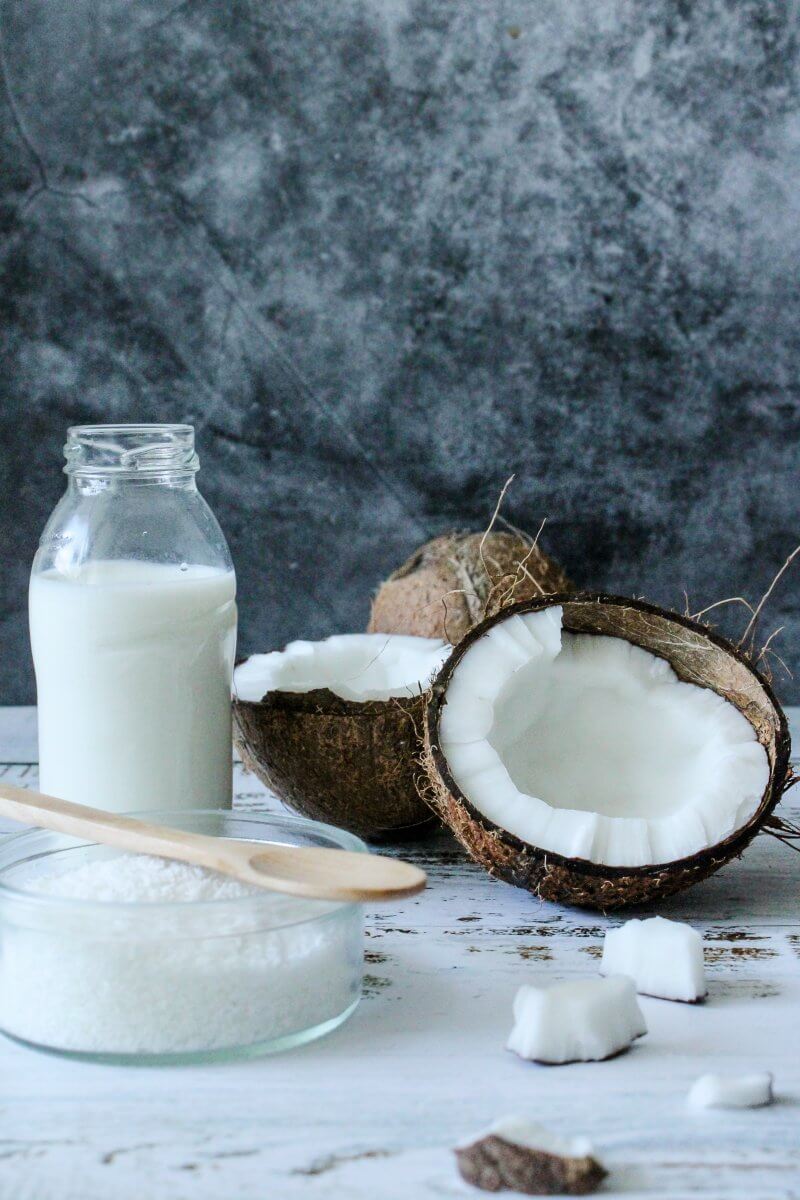
Pineapple Juice
Pineapple juice is a delicious and tangy liquid that’s obtained by pressing or blending fresh or canned pineapples. It’s a popular tropical beverage and a versatile ingredient in both cooking and mixology. Pineapple juice is sweet and bursting with tropical flavor, making it a fantastic addition to cocktails, marinades, and various dishes. It is readily available in the chill section in most supermarkets.
If you’re considering substituting pineapple juice for coconut water, you’ve made a good choice. While they both have tropical origins, they have different flavor profiles. Coconut water is light and mildly sweet with a hint of coconut, while pineapple juice is much sweeter and tangy with a bold pineapple taste.
To make the substitution, consider the following:
- Flavor Enhancement: Use pineapple juice in recipes where you want a sweet and tangy kick. It’s a fantastic addition to smoothies, marinades, or tropical-themed desserts.
- Adjusting for Sweetness: Be mindful of the sweetness level. You might need to reduce or eliminate added sugars in your recipe when using pineapple juice since it’s naturally sweet.
- Mind the Texture: Keep in mind that pineapple juice is a liquid, while coconut water is thinner. This could affect the texture of your dish, so adjust other ingredients accordingly.

Lemon Water
Lemon water is a simple and refreshing drink made by adding fresh lemon juice to water. It’s known for its tart, citrusy flavor and the health benefits it offers, such as hydration and vitamin C intake. Lemon water is a popular choice for those looking to add some zing to their beverages and stay refreshed.
If you’re thinking of substituting lemon water for coconut water in your recipes here’s how to do it:
- Flavor Transformation: Lemon water provides a zesty, tangy flavor that’s quite different from the mild sweetness of coconut water. Use it when you want to add a citrusy kick to your dish or drink.
- Hydration Factor: Like coconut water, lemon water can help keep you hydrated, making it a good choice for recipes that require a liquid component. Just be aware that it has a more pronounced flavor.
- Sour and Sweet Balance: Adjust other ingredients to balance the tartness of lemon water. You might need to add a sweetener to achieve the desired flavor profile if your original recipe was relying on the natural sweetness of the coconut water.
- Get Creative: Lemon water can be a versatile ingredient in cooking and mixology. It’s excellent in salad dressings, marinades, and as a base for cocktails or mocktails.
Experimenting with lemon water as a substitute for coconut water can lead to some exciting and unique recipes. It’s a great way to add a citrusy twist to your culinary creations while keeping them refreshing.

Cucumber Water
Cucumber water is a refreshing and hydrating drink made by infusing water with slices or pieces of fresh cucumber. It’s known for its mild, crisp flavor and is often enjoyed for its cooling and detoxifying properties. Cucumber water is a popular choice for staying hydrated with a subtle hint of cucumber essence.
If you’re considering substituting cucumber water for coconut water in your recipes, it can bring a unique twist to your dishes. Here’s how to make the substitution:
- Flavor Profile: Cucumber water offers a gentle, earthy flavor with a hint of cucumber. It’s quite different from the natural sweetness of coconut water. Use it when you want a milder, refreshing taste.
- Hydration: Just like coconut water, cucumber water can help keep you hydrated. This makes it a suitable choice for recipes that require a liquid component, especially if you’re looking for a more subtle flavor.
- Balancing Act: Adjust other ingredients to accommodate the flavor of cucumber water. If your original recipe relied on the sweetness of coconut water, you might need to add a sweetener to achieve the desired taste.
- Pairing and Garnishing: Cucumber water pairs well with herbs like mint and can be garnished with cucumber slices for an extra touch of freshness.
Using cucumber water as a substitute for coconut water can lead to innovative and health-conscious recipes.
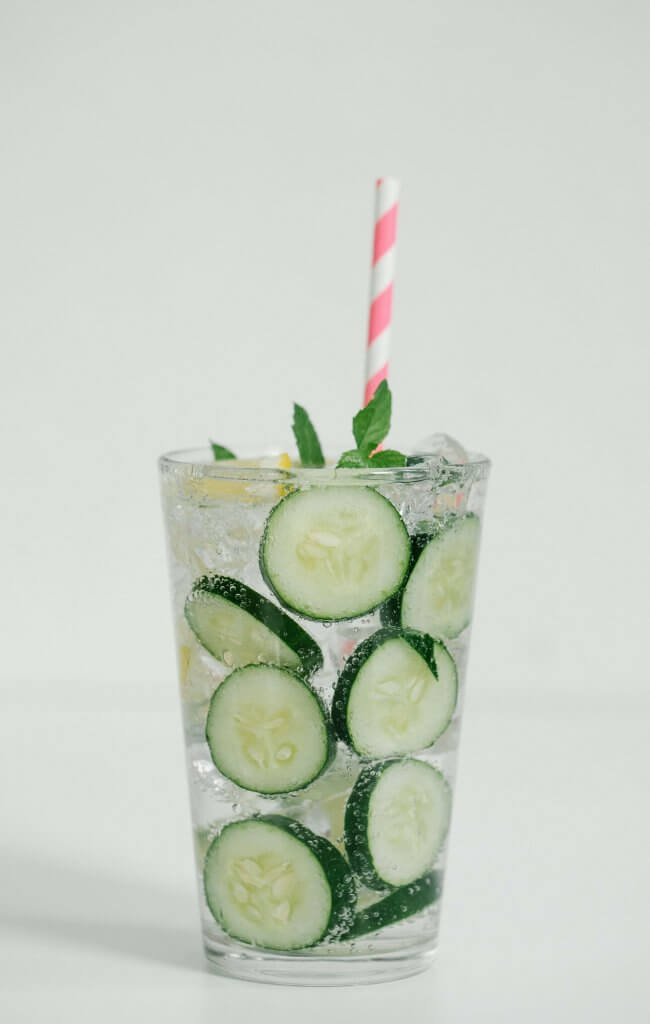
Watermelon Water
Watermelon water is a hydrating and naturally sweet beverage made by blending fresh watermelon chunks and straining the liquid. It’s known for its delightful, refreshing taste, making it a perfect summer drink. Watermelon water is not only delicious but also provides essential hydration and a dose of vitamins.
If you’re thinking about substituting watermelon water for coconut water in your recipes, it can bring a burst of sweet and fruity flavor. Here’s how you can make the switch:
- Flavor Transformation: Watermelon water offers a distinctly sweet and juicy taste, quite different from the mild sweetness of coconut water. Use it when you want to infuse your recipes with a summery and fruity essence.
- Hydration Factor: Just like coconut water, watermelon water is an excellent source of hydration, making it a suitable choice for recipes that require a liquid component.
- Adjust Sweetness: Depending on your original recipe, you might need to adjust the sweeteners and other flavor components to balance the increased sweetness from watermelon water.
- Refreshing Twists: Watermelon water pairs wonderfully with fresh herbs like mint and basil, and it can be used in a variety of beverages and dishes, from smoothies and cocktails to salad dressings and sauces.
Experimenting with watermelon water as a substitute for coconut water can result in some colorful and summer-inspired recipes. It’s also a fantastic way to add a burst of fruity flavor while keeping your creations perfectly refreshing.
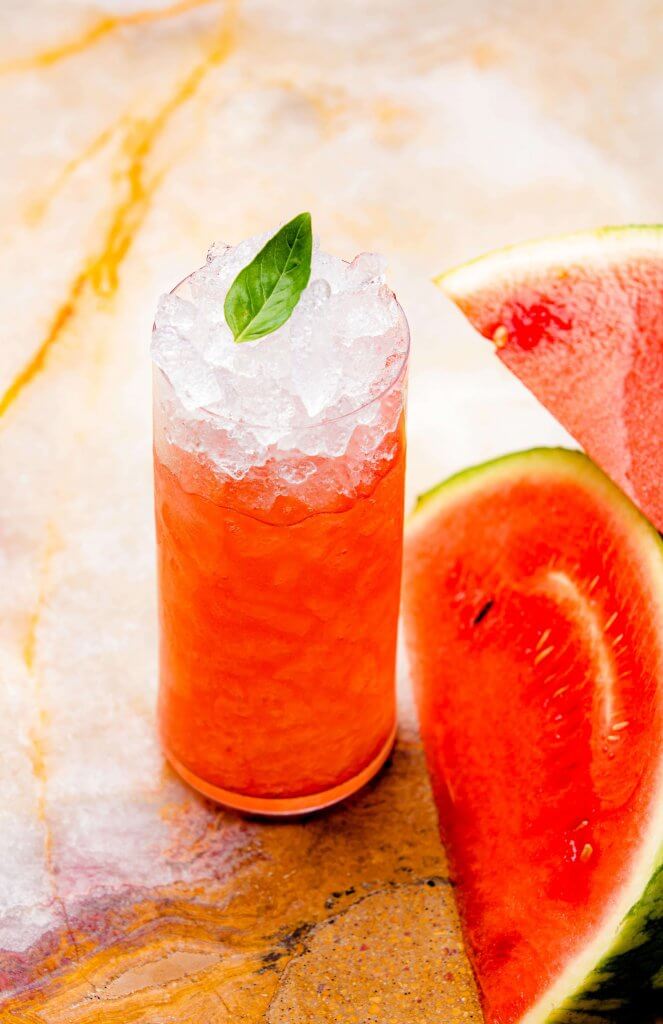
Aloe Vera Juice
Aloe vera juice is a liquid extracted from the succulent leaves of the aloe vera plant. It’s known for its potential health benefits, including soothing digestion and hydrating the body. Aloe vera juice has a slightly bitter, herbal flavor and is often consumed for its potential healing properties.
If you’re considering substituting aloe vera juice for coconut water in your recipes, it can bring a unique twist and potential health benefits. Here’s how you can make the substitution:
- Flavor Variation: Aloe vera juice has a distinctly herbal and slightly bitter taste, quite different from the mild sweetness of coconut water. Use it when you want to add a herbal and potentially soothing element to your dishes or drinks.
- Hydration and Wellness: Aloe vera juice is believed to offer various health benefits, such as aiding digestion and supporting skin health. Consider using it in recipes where you want to emphasize these potential benefits.
- Balancing Act: Be aware of the herbal bitterness in aloe vera juice. You might need to adjust other ingredients, such as sweeteners or citrus, to balance the flavor.
- Health-Conscious Recipes: Aloe vera juice can be a great addition to wellness-focused recipes like smoothies, detox drinks, or dishes where you want to emphasize its potential health properties.
Use aloe vera juice as a substitute for coconut water in health-conscious recipes. It’s an excellent way to bring a unique herbal dimension to your culinary creations.
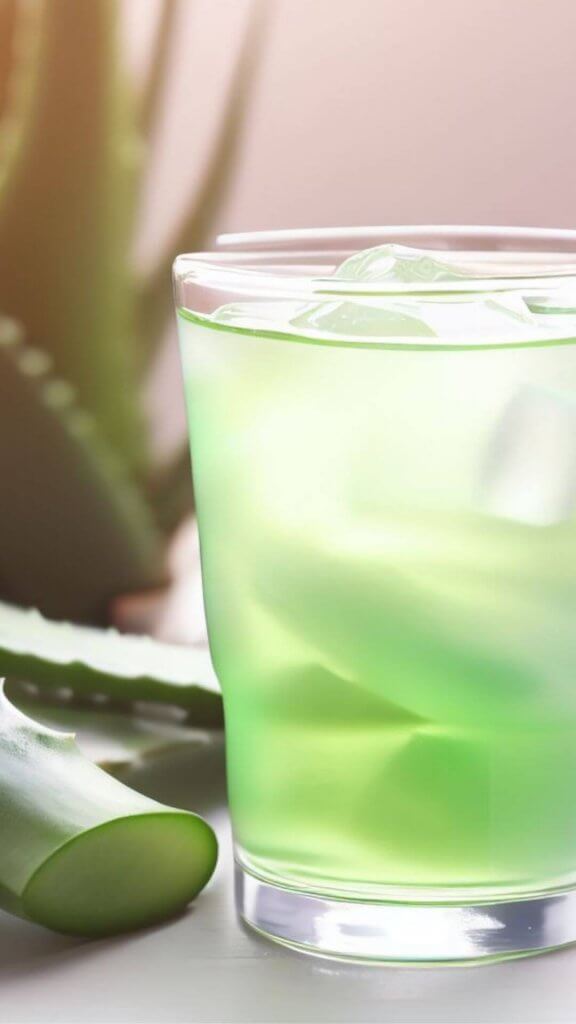
Cashew Juice
Cashew juice, also known as cashew apple juice, is a delicious and tropical beverage made from the liquid extracted from the cashew apple, which is the swollen stem of the cashew fruit. It has a sweet and slightly tangy flavor with a tropical twist. Cashew juice is a popular choice in some parts of the world and is known for its refreshing taste.
If you’re thinking of substituting cashew juice for coconut water in your recipes, it can bring a unique and sweet-tangy flavor to your dishes. Here’s how to go about it:
- Flavor Infusion: Cashew juice provides a distinct sweet and tropical tang, which differs from the mild sweetness of coconut water. Use it when you want to introduce a tropical and fruity essence to your recipes.
- Hydration: Similar to coconut water, cashew juice can help keep you hydrated. This makes it a suitable choice for recipes that require a liquid component while infusing them with a fruity twist.
- Balancing Act: Be mindful of the sweetness and tang of cashew juice. Depending on your original recipe, you might need to adjust other ingredients, such as sweeteners or acids, to balance the flavors.
- Tropical Delights: Cashew juice is excellent for creating tropical-inspired dishes, such as beverages, marinades, and desserts, where you want to enhance the flavor profile with a sweet-tangy note.
Using cashew juice as a substitute for coconut water can lead to exciting new recipes. It’s a fantastic way to add a tropical and fruity twist to your culinary creations while maintaining the element of refreshment.
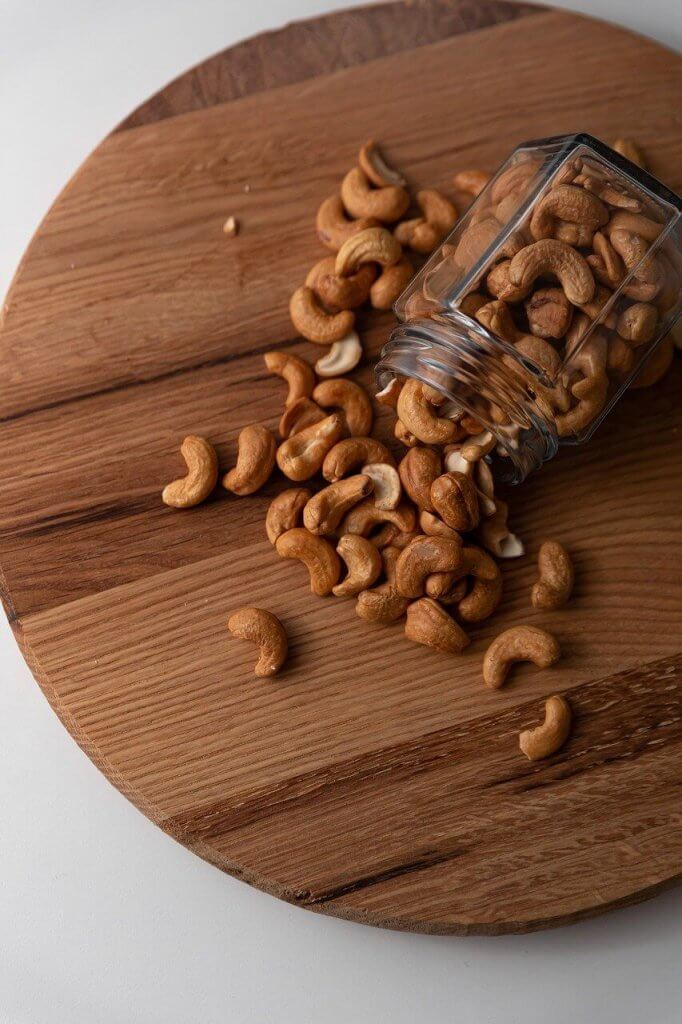
Oat Milk
Oat milk is a plant-based milk alternative made from whole oat grains. It has gained popularity as a dairy-free and vegan-friendly milk substitute. To make oat milk, oats are blended with water, and the mixture is then strained to extract the liquid. Oat milk has a mild, slightly sweet flavor and a creamy consistency, making it a great option for various culinary uses.
If you’re considering substituting oat milk for coconut water in your recipes, it can bring a creamy and slightly sweet aspect to your dishes. Here’s how you can make the substitution:
- Flavor and Texture: Oat milk offers a creamy texture and a mild, naturally sweet flavor. It’s quite different from the light sweetness of coconut water. Use it when you want a creamier, dairy-free element in your recipes.
- Hydration and Creaminess: Oat milk can be a great choice for recipes where you want to maintain a creamy texture while adding a subtle sweetness. It’s not as hydrating as coconut water, so be mindful of this difference.
- Adjusting for Creaminess: Depending on your original recipe, you may need to adjust other ingredients to maintain the desired consistency. Oat milk can work well in dishes like soups, curries, or creamy desserts.
- Vegan and Dairy-Free Options: Oat milk is a fantastic option for those following a vegan or dairy-free diet. Use it in coffee, tea, baking, and a wide range of recipes.
Using oat milk as a substitute for coconut water can open up a world of dairy-free and creamy possibilities. It’s an excellent way to create plant-based, indulgent dishes while accommodating the needs and preferences of some specific diets.
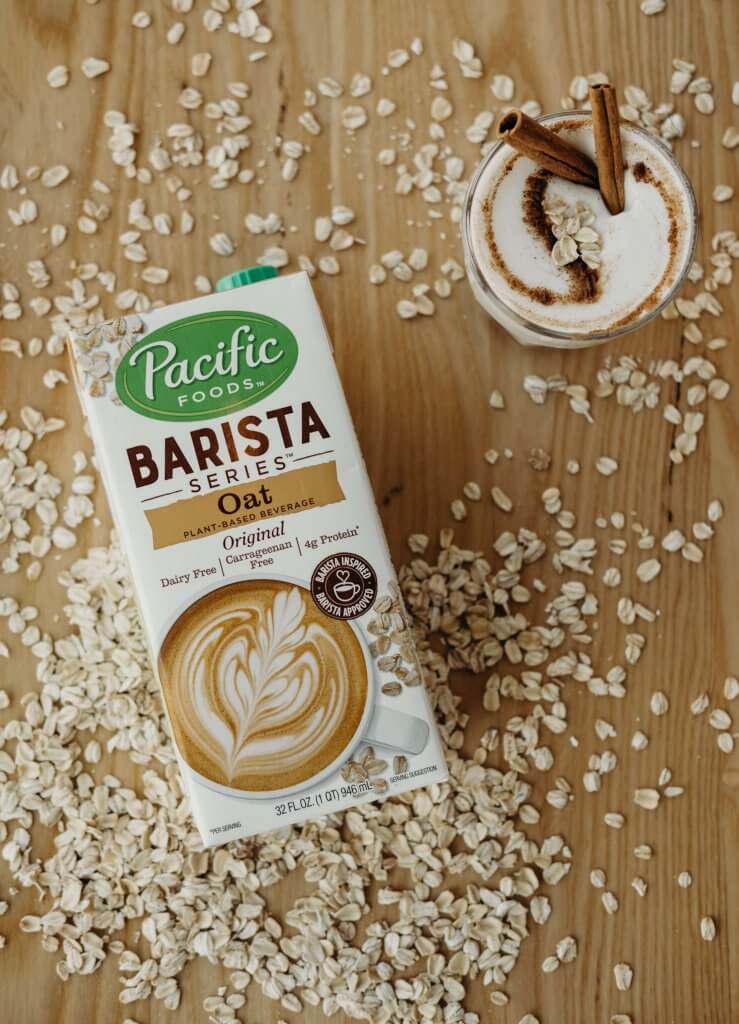
Plain Water
Ever thought of just using plain water instead of coconut water? Plain water – H2O in its purest form, without any added flavors, sweeteners, or additives. Water is vital for staying hydrated and maintaining overall health. It has no distinctive taste, which makes it a versatile choice for mixing and blending with other ingredients in recipes.
If you’re thinking of substituting plain water for coconut water in your recipes, it’s a great way to maintain hydration without the flavor nuances of coconut water. Here’s how to do it:
- Hydration: Water is the ultimate hydrator, and it can replace coconut water in recipes where the primary role of the liquid is to provide hydration.
- Balancing the Taste: Because water is neutral in taste, you’ll need to consider the balance of flavors in your recipe. If coconut water was providing sweetness or a mild coconut flavor, you may need to adjust other ingredients to achieve the desired taste.
- Versatility: Water can be used in virtually any recipe that requires a liquid component, from soups and stews to beverages and baking. It’s a universal choice.
- Health Benefits: Emphasize the health benefits of staying hydrated with plain water in your recipes. Mention its importance for overall well-being.
Using plain water as a substitute for coconut water is a practical choice. It keeps your recipes simple and focuses on the purity of hydration, making it a fundamental element in various dishes and beverages.

Rice Milk
Rice milk is a plant-based milk alternative made from milled rice (usually brown or white rice) and water. It’s a dairy-free and vegan-friendly option that has a mild, slightly sweet flavor and a thinner consistency compared to dairy milk.
If you’re considering substituting rice milk for coconut water in your recipes, it can bring a different flavor and texture to your dishes. Here’s how you can make the substitution:
- Flavor and Texture: Rice milk is thinner and has a milder, naturally sweet flavor compared to the light sweetness of coconut water. Use it when you want to introduce a creamier, dairy-free element to your recipes.
- Hydration and Creaminess: Rice milk is not as hydrating as coconut water, so consider this when choosing it as a substitute. It works well in recipes where you want a creamy texture while providing a mild sweetness.
- Balancing Act: Depending on your original recipe, you may need to adjust other ingredients to maintain the desired consistency and flavor. Rice milk is suitable for dishes like smoothies, cereal, and creamy soups.
- Vegan and Dairy-Free Options: Rice milk is an ideal choice for those following a vegan or dairy-free diet. Use in cooking, baking, coffee, tea, and various recipes.
Using rice milk as a substitute for coconut water can offer a vegan and dairy-free twist to your dishes. It’s a fantastic way to create creamy and plant-based recipes.
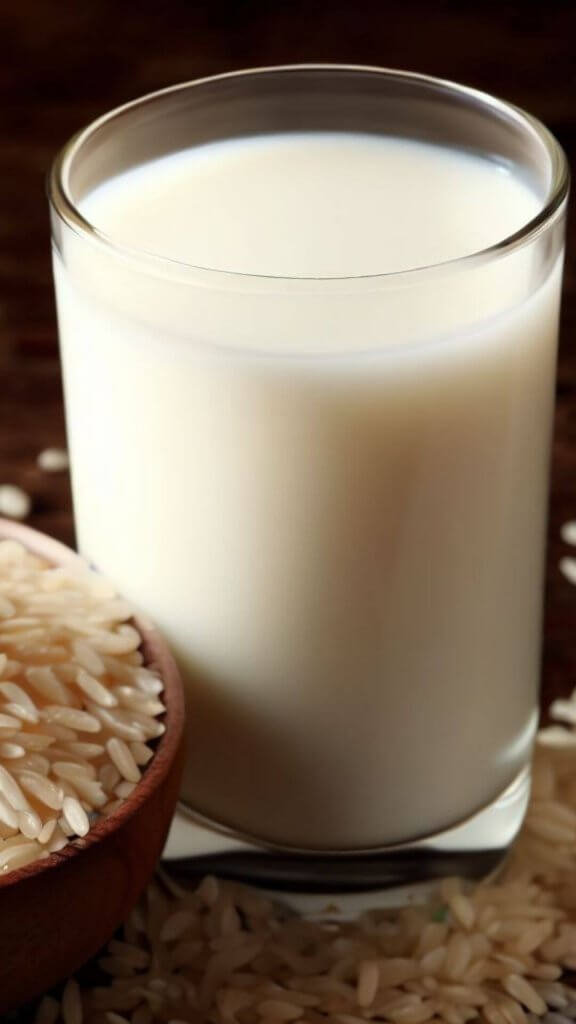
FAQs
Can you replace regular water with coconut water?
Well, coconut water has gained popularity as a natural and healthier alternative to many sugary beverages. So yes, you can replace regular water with coconut water, but it’s good to keep a few things in mind. Coconut water is a great source of hydration and is packed with electrolytes like potassium, which makes it fantastic after a workout. However, it does have calories and natural sugars, unlike plain water. So, while it’s a refreshing and nutritious option, it’s best to enjoy it in moderation and not as a complete substitute for regular water.
Can you make your own coconut water?
Making your own coconut water at home is a bit tricky because it naturally comes from young green coconuts. If you have access to fresh coconuts, you can definitely crack one open and enjoy the fresh water inside. Just grab a young green coconut, use a sharp knife to carefully cut off the top, and then pop in a straw to sip the delicious, hydrating liquid. It’s super fresh and full of nutrients. If you’re not up for the challenge of cracking coconuts, the store-bought versions are a convenient and tasty alternative.
Is coconut water safe to drink straight from the coconut?
Absolutely, coconut water is safe to drink straight from the coconut! In fact, it’s one of the freshest and most natural ways to enjoy it. Just make sure the coconut is young and green, as that’s when the water is at its best – sweet and full of nutrients. Once you crack it open, just pop in a straw and enjoy. It’s like nature’s perfect sports drink, right there for you! Just be sure the coconut looks healthy and hasn’t been damaged or contaminated. We should also point out that drinking too much coconut water can lead to stomach upsets, or even diarrhea, due to the high level of potassium it contains.
Summary for Coconut Water substitutes
Okay – that’s you all sorted with suitable substitutes for coconut water.
Sure, here’s a summary of substituting various liquids for coconut water in your recipes:
- Lemon Water: Lemon water provides a zesty, tangy kick, great for recipes needing citrusy flavor. Adjust sweetness and other ingredients as needed.
- Cucumber Water: Cucumber water offers a mild, fresh taste and hydration. Use it when you want a subtle, cooling element in your dishes.
- Watermelon Water: Watermelon water adds a sweet and fruity essence, perfect for a summery twist in your recipes. Adjust sweetness and balance flavors accordingly.
- Aloe Vera Juice: Aloe vera juice brings a unique herbal dimension and potential health benefits. Be mindful of its bitterness and adjust other ingredients.
- Cashew Juice: Cashew juice introduces a sweet-tangy tropical flavor. It’s ideal for creating tropical-inspired dishes while maintaining a fruity profile.
- Oat Milk: Oat milk is a creamy, slightly sweet dairy-free option. Use it to bring a creamier, vegan twist to your recipes and adjust other components as needed.
- Plain Water: Water is the ultimate hydrator, suitable as a straightforward substitute for coconut water in recipes where hydration is the primary purpose.
- Rice Milk: Rice milk is a dairy-free choice with a milder, slightly sweet flavor and a thinner consistency. It’s great for adding creaminess in vegan and dairy-free recipes.
Choosing the right substitute depends on the flavor, texture, and purpose in your recipes. Each alternative offers something new – you just have to choose!
We have gathered together a lot more facts on ingredients such as herbs, spices, oils, nuts, etc. if you would like to learn some more.
Or if you need to swap out another ingredient have a look at our Substitutes section.
